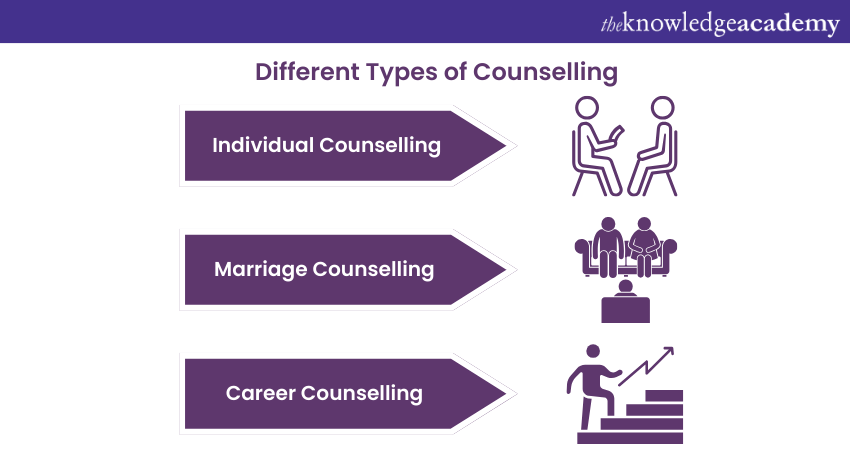The Impact of adhd counselling in Academic Success
A Comprehensive Overview to the Numerous Kinds of Counselling and Their Effect
Counseling encompasses a variety of therapeutic methods, each developed to satisfy distinct mental health needs. From the organized strategies of Cognitive-Behavioral Treatment to the understanding nature of Person-Centered Therapy, these techniques use distinctive pathways to individual development. Family members treatment and Dialectical Behavior modification provide additional frameworks for recovery, while team counseling fosters community assistance. Comprehending these diverse methods can brighten their extensive effect on specific wellness. What remains to be checked out are the complexities of each method.

Recognizing Cognitive-Behavioral Therapy (CBT)
Although numerous healing methods exist, Cognitive-Behavioral Therapy (CBT) attracts attention because of its organized, goal-oriented nature. This type of treatment is based on the property that ideas, feelings, and habits are adjoined, and by changing unfavorable idea patterns, individuals can change their psychological responses and actions. CBT utilizes various strategies, such as cognitive restructuring, which helps clients identify and test altered ideas. Behavior activation motivates interaction in pleasant activities to combat depression.
Generally, CBT is a short-term therapy, usually long-term between 12 to 20 sessions, making it obtainable for those looking for fast outcomes. Its performance has been well-documented in dealing with anxiety conditions, anxiety, and other psychological wellness problems. The therapist's duty is to assist clients through workouts and homework projects, cultivating self-awareness and promoting long-term coping techniques. This functional technique equips people to take control of their psychological wellness, inevitably causing enhanced life contentment.
Checking Out Person-Centered Therapy
Person-Centered Therapy, developed by Carl Rogers, offers a contrasting approach to Cognitive-Behavioral Treatment by emphasizing the client's subjective experience. This healing design prioritizes the person's perspective, fostering a setting of compassion, unconditional favorable respect, and credibility. By allowing clients to explore their sensations and ideas without judgment, therapists facilitate individual growth and self-discovery.
The core tenet of Person-Centered Therapy is the belief that individuals possess the fundamental capability for self-healing and personal development. In this setting, the specialist works as an encouraging overview instead of a directive authority, motivating clients to organize their own journey. This strategy is specifically reliable for those facing issues such as reduced self-confidence, anxiousness, or anxiety, as it empowers them to face and comprehend their feelings. Eventually, Person-Centered Therapy cultivates a solid healing partnership, fostering depend on and openness necessary for significant adjustment.
The Role of Household Therapy in Healing
Household therapy offers as a crucial element in the recovery process for individuals and their relationships. This restorative strategy focuses on enhancing communication, resolving conflicts, and promoting deeper connections among member of the family. By attending to dysfunctional characteristics, family treatment motivates each participant to reveal their thoughts and sensations in a secure environment, advertising understanding and empathy.

The effect of family therapy prolongs beyond the sessions, as boosted relationships can bring about improved emotional wellness for all entailed. In general, family members therapy plays a vital function in healing by cultivating unity, durability, and shared assistance among family participants, ultimately assisting them toward a healthier, more satisfying life with each other.
Unpacking Dialectical Behavior Modification (DBT)
Structure on the structure of restorative strategies that enhance emotional health, Dialectical Behavior modification (DBT) offers a structured framework for people dealing with intense emotions and behavior challenges. Created by Marsha Linehan, DBT incorporates cognitive-behavioral methods with mindfulness methods, aiming to aid customers manage overwhelming sensations and enhance interpersonal performance.
The therapy is especially useful for those identified with Borderline Personality Problem however is also applicable to an array of other psychological health and wellness concerns. relationship therapy. DBT consists of specific treatment sessions and skills training teams, focusing on 4 essential ability sets: mindfulness, distress resistance, emotion regulation, and interpersonal effectiveness
The Benefits of Team Counselling Procedure
While specific therapy supplies useful understandings, team counseling sessions provide special benefits that can significantly improve the therapeutic experience. One crucial advantage is the sense of area that arises among individuals. People commonly find comfort in sharing their experiences with others encountering similar obstacles, cultivating a helpful environment that lowers sensations of seclusion.
Team sessions encourage diverse point of views, permitting individuals to learn from each other's coping methods and understandings. This cumulative wisdom can result in improved problem-solving capacities and a more comprehensive understanding of personal issues.
Furthermore, group therapy usually advertises accountability, as members motivate one another to pursue their goals and follow their dedications. The cost-effectiveness of team therapy makes it an easily accessible option for lots of individuals seeking assistance. In general, the collective nature of group counseling sessions can significantly enrich the therapeutic journey.
Frequently Asked Questions
What Credentials Do Specialists Required to Practice Counseling?
Therapists normally require a pertinent level in psychology or therapy, in addition to monitored scientific experience. Furthermore, they should obtain appropriate licensure or qualification to exercise lawfully, guaranteeing adherence to professional criteria and moral standards.
How Do I Choose the Right Sort Of Treatment for Me?
Picking the right kind of therapy includes examining individual demands, discovering different methods, taking into consideration therapist specializeds, and looking for suggestions. Comprehending specific objectives and choices can greatly enhance the effectiveness and complete satisfaction of the therapeutic experience.
Are Online Therapy Procedure as Effective as In-Person Ones?
The effectiveness of on the internet therapy sessions contrasted to in-person ones frequently depends upon specific choices and situations. Research study shows that both approaches can generate favorable outcomes, though some may find higher comfort in face-to-face interactions.
Exactly How Lengthy Does Therapy Normally Last?

What Should I Expect Throughout My Initial Counseling Session?
During the very first therapy session, customers can expect an introduction, discussion of their concerns, establishment of objectives, and a summary of the counseling procedure - low cost therapy. This preliminary meeting intends to construct rapport and warranty comfort